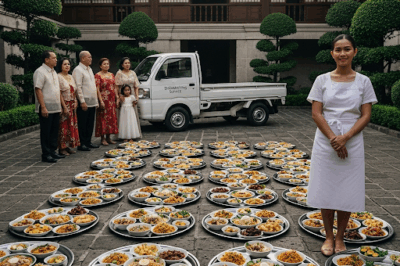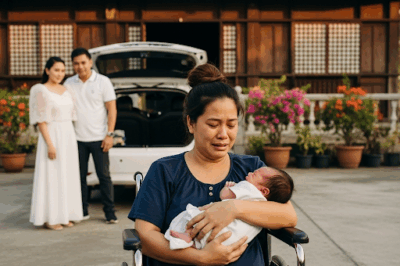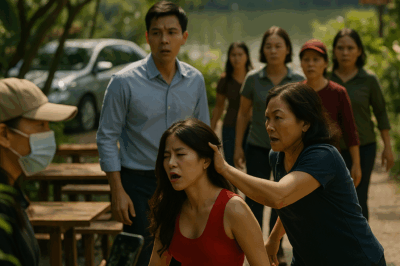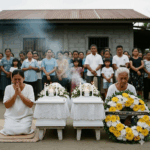Just Married, I Had to Quietly Pack My Bags and Leave for My Mother’s Side Because of What My Mother-in-Law Did to Me on My Wedding Night
People often say the wedding night is the most sacred night of a woman’s life. But for me, Ngoc Han, it was the first night I learned to swallow my tears and still keep my back straight.
I married Quoc Bao after a year of dating. He’s a quiet, gentle construction engineer, and I’m an accountant from an ordinary background. My parents passed away early, and I was raised by my aunt. I’ve been independent since I was 18.
When Bao proposed, I didn’t ask for a house or a car—just his genuine love and his family’s acceptance. Our wedding was held at his family’s house, lively and packed with guests. Mrs. Tuyet, my mother-in-law, greeted everyone like a host of a village festival. She proudly introduced me, saying, “My daughter-in-law is very gentle and well-mannered.”
I stood beside her, forcing a smile while my feet went numb in my high heels, and sweat soaked the back of my traditional dress.
I knew Mrs. Tuyet was a retired middle school teacher—strict, meticulous, and quick to judge—but I thought if I just treated her sincerely, she would eventually come to love me. I was wrong.
The party ended past 11 p.m. I was exhausted. Just as I changed clothes and planned to lie down for a bit, there was a loud knock at the door.
“Han, come out, I have something to say,” she called.
I opened the door. Mrs. Tuyet stood there, eyes sharp like knives. “There’s a pile of laundry in the bathroom. As the new daughter-in-law, you should know your responsibilities. Other brides don’t even sleep on their wedding night—they stay up serving their in-laws.”
I hesitated. “Mom, it’s really late. Can I do it early in the morning?”
She gritted her teeth. “Already asking to sleep? A woman’s virtue is in her willingness to endure hardship. No laziness in this house.”
Quoc Bao stood behind her, avoiding eye contact. I looked to him for support, but all I got was a weak, indifferent response:
“Try your best. That’s just how my mom is—she means no harm.”
It was like someone poured a bucket of ice water over me.
I stepped into the bathroom. The flickering yellow light made everything look gloomy. The pile of laundry included everyone’s undergarments—even my sister-in-law’s and mother-in-law’s bras.
I washed each item with trembling hands. The cold water bit into my skin, my eyes stung, and from outside, Mrs. Tuyet’s voice echoed:
“Make sure you rinse thoroughly. In this house, dirty laundry is unacceptable.”
The light cast my warped shadow onto the wall. The water turned murky. My wedding dress hadn’t even been hung up yet—it was still damp with sweat and the smell of fish noodle soup from earlier.
A smear of lipstick I’d accidentally left on the white pillow now looked like a dried bloodstain.
As I rinsed the clothes and turned around, I saw Quoc Bao standing silently at the door, watching me as I bowed over his mother’s underwear. He said nothing.
Moments later, I heard his bedroom door quietly close.
I clenched my teeth. Soap suds clung to my wrists, itching.
That was how my wedding night began.
The next morning, I woke up at 6 a.m., my face swollen from lack of sleep, my hands bright red. I went to the kitchen to cook porridge. After setting the table, Mrs. Tuyet came out.
“Why is the minced pork porridge so salty? We don’t eat peasant food like that in this house.”
I stood frozen.
My sister-in-law, a college senior, yawned lazily, glanced at me, and muttered…
“Right After the Wedding, I Quietly Packed My Bags and Returned to My Mother’s Because of What My Mother-in-Law Did on My Wedding Night.”
“Mom, maybe she’s not used to new men yet, but it’s so gross,” my sister-in-law muttered.
Quoc Bao remained silent, eyes glued to his phone. I felt like a stranger lost in someone else’s family. I couldn’t swallow the food; even the porridge ended up being thrown out.
That night, I quietly told my husband, “I think we should rent our own place. If I keep living like this, I don’t think I can keep my composure.”
He frowned. “You’re being overly sensitive. My family’s always been like this. My mom is strict, but she means well. You should learn to adapt instead of being so proud.”
I turned my face away. Something inside me broke—not because of the meal, not because of the dirty laundry, but because of the look in my husband’s eyes. There was no place for me in them.
On the third night, it rained heavily. I had stomach pain and felt ice cold. I knocked on Quoc Bao’s door, but it was Mrs. Tuyet who opened it first.
“What’s with the moaning like a ghost? A woman should know how to endure. I gave birth to two kids and still worked the fields.”
I whispered, “Mom, I just need a glass of warm water.”
“Get it yourself. No one has time to serve you all day in this house.”
I dragged myself to the kitchen, hands trembling as I lit the stove to boil water. Thunder and lightning flashed outside. Inside, I felt like someone was slowly pulling away the last threads of my courage.
On the fifth day after the wedding, I woke up earlier than usual. I neatly folded my clothes, placed the still-unwashed wedding dress on the bed, and left a note on the table:
“I’m sorry, but I can’t live in a house where I’m nothing but an extra. On my very first night as a daughter-in-law, I learned that not every family has room for someone who’s thoughtful.
P.S. I’m six weeks pregnant. I’ll keep the baby, if only to preserve what’s left of my dignity.”
I walked out of that house. The rain had just stopped. The early sunlight filtered through—golden, faint, but not warm.
I didn’t cry. My heart felt lighter, like I’d finally shed a weight I had carried for years. No one called my name, no one asked me to stay—just the sound of the wooden door closing behind me, like a silent farewell.
I left that house on a quiet morning—not in anger, not in chaos—but with a shaky note I knew no one would bother to read, but maybe it didn’t matter anymore.
I rented a small room near an industrial zone. The corrugated iron roof was low, the walls stained with mold, but at least here, I could breathe.
No more judgmental glances, no more sarcastic remarks in the early morning. No more husband. But also, no more pain.
On my first day away, I was so exhausted I slept through the entire day. When I woke up, my hands still trembled from the lingering nausea.
I looked up at the water-stained ceiling and asked myself, “Did I really do the right thing?”
A few friends called, scolding me for leaving before the wedding week was even over. I gave a faint smile. I didn’t need to explain. They didn’t understand—and they never would.
They’d never understand a honeymoon night spent washing other people’s underwear, surrounded by mocking laughter and the indifferent gaze of the man you just married.
I quietly went to a private clinic for my first ultrasound.
The doctor looked at the screen, then turned to me and gently said, “About six weeks along. The heartbeat is strong. Do you want to keep it?”
I gripped my handbag tightly. I wasn’t rich. I had no one beside me. But I had faith.
I nodded. “Yes, I’ll keep it.”
The doctor smiled and handed me a black-and-white photo. A small dot in the ultrasound image—like a tiny, resilient seed.
I pasted it in my notebook and wrote beneath it:
“You are the best decision your mother ever made.”
The first month passed slowly—peaceful, but heavy.
I redid my resume and applied to work as an accountant at a mechanical workshop. The job was tough, the owner strict, but the pay was stable.
I turned down all invitations to go out or hang out. I started living life on my terms—no one’s approval needed.
Sometimes, I thought of Quoc Bao—not because I missed him, but because I regretted him.
Regretted a man who looked composed on the outside but was hollow within. Regretted a small, youthful dream: getting married, living with your in-laws, having kids, and being loved.
I knew they had read the letter I left behind. But no one contacted me.
Not a single phone call, not one word of concern.
My mother-in-law was probably secretly pleased. She once told a neighbor, “She’s an orphan. No dowry, nothing to offer. She won’t last long in my house.”
One evening, after a night shift, I left the maternity clinic, my baby bump already showing, when I saw a familiar face walk in.
It was Minh Thu, my sister-in-law’s best friend. She widened her eyes at my belly.
“Oh, Han! You’re pregnant?”
I stayed silent. But her eyes lit up, like she’d just stumbled upon a juicy piece of gossip.
I knew the news would soon reach my ex-in-laws.
Sure enough, two days later, I got a phone call—from Quoc Bao.
I hesitated before picking up. His voice was the same—flat and emotionless.
“You’re still okay?”
“I’m fine,” I replied briefly.
“I heard you’re pregnant.”
I looked out the window. Light rain was falling, soft like the years of quiet suffering I’d endured.
“Yes, I am. And I’ll raise the child on my own.”
“Mom wants you to come back. She said if you’re willing to forgive, everything can go back to normal.”
I laughed.
A dry, bitter laugh stuck in my throat.
“Back to normal? After all the insults? After the basin of dirty underwear? After the porridge thrown away just because it wasn’t to their taste?
After you stood there, watching your mother humiliate your new wife on our wedding night—and you couldn’t say a single word?
There was silence on the other end.
I continued, my voice lower:
“If you called to check on the baby, just remember—this child is the result of a marriage where the father couldn’t even protect the mother.”
I hung up.
After that call, everything went quiet—quieter than I expected.
No more messages. No more phone calls. No one came looking for me.
But I knew… beneath that silence, a storm was brewing.
Three weeks later, I received a letter from the court.
My ex-husband’s family was requesting a DNA test once the child was born.
They Wanted to Make Sure the Child Was Theirs by Blood.
I laughed silently.
They had never once called to ask if I was still alive, had left me clutching my stomach in pain in the middle of a rainy night, had let their son stand mute like a shadow on our wedding night. But now, they were afraid of losing face, afraid of not being able to claim their grandchild.
I went to court and signed the documents. I didn’t object.
I had nothing to prove. This child was mine—and my belief in that was all that mattered.
In my sixth month of pregnancy, I moved to a smaller rental room. It had sunlight and a small private kitchen. I began knitting woolen scarves for my baby, reading parenting books, and listening to soft music in the evenings. On the wall, I taped the ultrasound image—now a clearly formed fetus with arms, legs, and a slightly tilted head that looked like it was smiling.
Every night, I’d rest my hand on my belly and whisper:
“My child, your mother isn’t rich, and she doesn’t have anyone backing her. But I promise—I’ll never let anyone hurt you the way they hurt me.”
One day at the market, I saw Quoc Bao waiting at the gate of my boarding house. He looked disheveled—sunken eyes, messy hair. He sincerely apologized.
I remained silent. There was no more resentment inside me—just no room left for him.
“My mom has high blood pressure. She cries a lot lately. She says she misses her grandchild.”
I looked at him with firm eyes.
“I haven’t even given birth yet, but I’ve already learned what it means to be a mother—it means protecting your child from all harm, including harm from his own grandparents.”
Quoc Bao was speechless.
I walked past him, a bag of oranges in hand, not looking back.
The afternoon sun fell on my hair, golden and radiant—like a rebirth.
My son was born on a sunny morning in May.
His first cry made me burst into tears like I’d never cried before. Partly from pain, partly from relief, and partly from pride—because I had overcome everything just to hold this tiny life in my arms.
I named him Bình An (Peace).
When we were discharged from the hospital, no one from my former in-laws came to pick us up. I knew they didn’t truly care. What they cared about was whether or not the child carried their blood.
And when the DNA results came in—confirming that Bình An was indeed their biological grandson—was the exact moment the curtain of hypocrisy officially lifted.
That afternoon, I had just finished bathing my baby when loud knocks pounded on my door.
I opened it to find my former mother-in-law, Mrs. Ngoc, towering in front of me. Without greeting me or looking me in the eye, she barged straight in. Her gaze swept across the tiny, dimly lit room—the yellowing light, the old gas stove. Her lips tightened like she’d just swallowed a bitter pill.
“I’ve come to take my grandson home. In a dark, poor place like this, how can he grow up properly?”
I held Bình An closer to my chest, my voice calm but firm.
“My son doesn’t lack food, clothes, or love.”
“You have no right to raise my grandchild,” she snapped, eyes blazing.
“You’re the one who left your husband, shamed our family, and now you’re pretending to be a good mother?”
I looked straight at her. I didn’t bow my head.
“You once stood there watching your pregnant daughter-in-law wash dishes in the rain.
You once said women like me are only fit to wipe feet.
So tell me—did you come today out of love or pride?”
The room fell silent.
Bình An whimpered in my arms and then went quiet again. Maybe he, too, could feel the tension thick in the air.
Mrs. Ngoc’s face paled.
She didn’t say another word. Just threw back a parting line:
“You’ll regret this.”
And then she left.
But I didn’t regret it.
I kept working, raised my son, and opened a small convenience stall at the entrance of our alley. I wasn’t rich, but I had control over my life.
Every time I saw my son grow—learning to roll over, to crawl, to say “Mama” for the first time—I knew every sacrifice had been worth it.
Then one day, fate knocked again.
But this time, it knocked on my ex-husband’s door.
An old friend messaged me, saying something big had happened in Quoc Bao’s family.
I wasn’t curious, but my heart still fluttered with unease.
A week later, I got the official news—from Quoc Bao himself.
He came looking for me on a rainy afternoon, thin and frail, his hair prematurely graying, his face sunken and tired.
“Your mother had a stroke,” he said. “She’s paralyzed on one side and can’t speak. Your sister is under investigation for corporate violations. The family’s fortune is nearly gone.”
I stood in silence.
Just a year ago, they looked down on me for being poor, for not being worthy of entering their family. Now, the same mother-in-law who once held the power to dictate life and death within that household was in a wheelchair, vacant-eyed and speechless.
The family was shattered.
“I’m not asking for anything,” Quốc Bảo said. “I just want to see my son once. Just once. Is that okay?”
I looked at him for a long time. This man, once my husband, who had silently watched his mother humiliate me for months, now stood before me looking like a storm-ravaged field.
I didn’t answer right away. But eventually, I led him into the room where Bình An was lying on the bed, playing with a small stuffed animal.
Quốc Bảo stepped forward and knelt.
“Bình An… I’m your father.”
The little boy looked at him—not afraid, not crying—just curious at the strange man. Then he turned to me and babbled:
“Mama?”
I nodded gently.
“Yes, sweetie. This is… a relative.”
Quốc Bảo’s eyes turned red. And I knew—at that moment—he truly felt what he had lost.
Not money, not reputation… but a family he could have saved.
After that visit, he quietly left. He never asked for custody. Never demanded anything. I didn’t forbid him from visiting, but he only came that one time.
As for my former mother-in-law, I heard she was moved into a nursing home, with no one to care for her regularly.
His sister was prosecuted. Their house seized. Cars gone.
Someone asked me:
“She tortured you. And now that she’s fallen, do you feel satisfied?”
I didn’t answer.
Not because I forgave her—but because I understood: karma hits hardest when the person is too broken to fight back.
And I didn’t need to push anyone further into the abyss.
I just quietly carried my son to the park, showed him flowers, sunlight, and the world through eyes free from sorrow.
I chose to raise my child with the kindness I never received.
One afternoon near year’s end, I received a handwritten letter—clumsy, shaky handwriting. It was from my former mother-in-law.
“I used to think you weren’t worthy of being my daughter-in-law.
Now I realize—I wasn’t worthy of having someone like you in my family.
If I could live again, I would learn to stay silent.
I would learn to see people with my heart, not through property deeds or dinner trays.”
At the bottom was a crooked line, clearly written with her left hand:
“Thank you… for not teaching my grandson to hate me.”
I folded the letter. I didn’t cry.
But I felt a breeze through the window—cool, cleansing.
Like a piece of my soul had been rinsed clean.
Like the past had quietly shut its door, needing no dramatic farewell.
That evening, I sat by my small shop, organizing packets of instant noodles.
Bình An was inside, babbling as he practiced counting in toddler-speak.
The sky turned gray. Wind howled through the alleyway, the first monsoon rain coming.
At exactly 5 PM, a stranger walked in. A thin woman, hair tied with a faded elastic, dark circles under her eyes, but an urgent look.
“Excuse me… Are you Ms. Uyên?” she asked cautiously.
I nodded, wary.
“I work with Ms. Vân—your old friend. She sent me to give you this.”
The woman held out a thin folder, both hands offering it with care.
Inside were documents transferring ownership of a small house on the outskirts of District 9.
The owner: Ngọc Lan—my former mother-in-law.
I was stunned.
At the bottom was a handwritten note. The handwriting shaky, but clear.
“This house was meant for Quốc Bảo when he moved out.
I wanted to keep it in case of emergencies, but now… I realize no one deserves it more than you.
You raised my grandson with nothing.
You deserve at least a roof.
Please live peacefully if you can.
Don’t let him remember me as someone cruel.”
I sat in silence for a long time.
Not because I was moved—but because I felt empty.
For so long, I’d expected nothing from her.
Now, this final gift didn’t bring forgiveness—but it didn’t bring resentment either.
It was just… an ending.
A quiet full stop to a chapter long closed.
A week later, I took Bình An to see the new house.
It was small—one floor and a loft—painted pale green.
In the front yard grew wild banana trees.
In the back, the brick wall stood unfinished, still raw.
But I didn’t see it as ugly.
I saw it as a place to begin again.
“Mama, are we moving here?” Bình An asked, eyes bright.
“Yes. From now on, this is our home.”
He grinned wide and ran across the yard, waving.
“I have a place to play soccer now! Mama, the sun is so pretty here!”
I looked at him—and it was like the first ray of sunlight had finally pierced through the long, dark cloud that had followed us for years.
I closed the convenience store and opened a small eatery in my new home. Still the same familiar hands, but now I cooked not to repay the world’s debts—but to nurture a dream.
The little restaurant had only a few old wooden tables and chairs, a tin roof slapped together hastily, yet more and more customers showed up each day. Word spread: “There’s this place with the best crab noodle soup.”
“The lady owner is kind, and her seasoning is so balanced you’ll never forget it after just one taste.”
One noon, as I was clearing a table, a familiar figure stepped through the door—it was Quốc Bảo.
I wasn’t surprised. I wasn’t afraid.
I simply nodded silently and gestured for him to sit.
He hesitated, then said, “I heard you opened a little restaurant… and Bình An’s been bragging that his mom makes crab noodle soup better than any restaurant, so… I came to try it.”
I didn’t ask why. I simply brought out a hot bowl of soup and set it in front of him.
He bowed his head and began to eat, slowly—like someone trying to swallow a piece of memory whole.
When he finished, he set his chopsticks down and looked at me sincerely.
“I was wrong, Uyên.
Not just for letting my mother insult you… but for never having the strength to protect the woman I married.”
I said nothing.
There was no more anger left in me—only a quiet exhaustion that had long since turned to stone.
He continued,
“If you allow it… I’d like to visit our son regularly. No title, no condition. I just want to be his father. Truly.”
I looked at him for a long while.
“I’ve never stopped him from seeing his dad. But remember this—don’t make promises to that boy unless you can keep them.
He’s not like grown-ups. He believes with his whole heart.”
Quốc Bảo froze, then nodded.
That day, he spent the whole afternoon playing with his son. Bình An chattered about school, clung to his father’s neck and wouldn’t let go. I stood in the kitchen, rinsing bowls, glancing up at the last rays of sunlight streaming through the window.
I never thought there’d come a day when I’d feel at peace seeing my child laugh with his father.
Time passed.
My little eatery grew more and more crowded.
Bình An started first grade—well-behaved, smart, and always cheerful.
One day, he said to me:
“Mom, when I grow up, I’ll build you a house with a garden and a fish pond, okay?”
I smiled and nodded.
“Sure. But Mama doesn’t need a big house. Just having you nearby is more than enough warmth.”
He grinned and suddenly hugged me tight around the neck.
“Then I’ll stay with you forever.”
One evening, as I was folding towels after closing, I found a small box left on one of the tables.
Inside was an old wedding ring and a short handwritten note:
“My mother left this behind.”
“She said—if there’s a next life, give it to the woman he dares to stand up for.
I don’t want to keep it anymore.
It belongs with someone who deserves it.”
I looked at the ring.
Once, it had symbolized a beginning—but it was also the root of so much pain.
Now, it was just a piece of metal, lying quietly… like the memories that had long since settled in my heart.
I didn’t cry. I wasn’t moved.
I simply wrapped it gently and placed it in the back drawer of the kitchen cabinet.
There are things we don’t need to throw away—just leave them where they belong.
That night, Bình An had already fallen asleep, hugging his favorite stuffed toy.
I sat by the porch, a cup of hot tea in hand, gazing at the starry sky.
No one criticized me anymore.
No more contemptuous stares.
No more cold kitchens.
No more angry footsteps in high heels from a mother-in-law who belonged to the past.
Just me—and the dream of living life on my own terms: decently and freely.
No need for recognition. No need for apologies.
All I wanted… was to wake up each morning to the sound of my child calling:
“Mom!”
That is the greatest happiness any woman who’s ever known pain can ask for.
An old dream… quietly beginning again—steadfast, and sure.
News
SHOCKING EXIT! Amber Torres is GONE from Eat Bulaga. The REAL reason behind her sudden disappearance will leave fans in total disbelief… you won’t see this coming!/th
SHOCKING EXIT! 😱 THE REAL REASON WHY AMBER TORRES IS NO LONGER ON EAT BULAGA! 💔 Fans Left in Disbelief For loyal viewers…
Meeting the boyfriend’s family and being told to wash the dishes for fifty banquet tables, the beautiful young woman handled it so cleverly that his whole family respected her and urged a quick wedding…/th
Meeting the boyfriend’s family and being told to wash the dishes for fifty banquet tables, the beautiful young woman handled…
After giving birth, the wife suffered complications that left her unable to walk normally. The husband abandoned his wife and newborn to chase another, wealthier woman—and exactly three years later he was left humiliated when he heard the news…/th
After giving birth, the wife suffered complications that left her unable to walk normally. The husband abandoned his wife and…
An elderly father—“the poor egg seller”—came to his son’s wedding carrying nothing but a bag of eggs as a gift, and what the daughter-in-law did left everyone speechless…/th
An elderly father—“the poor egg seller”—came to his son’s wedding carrying nothing but a bag of eggs as a gift,…
Happy to have married a rich man, with our own condo in the heart of District 1—on our wedding night, I was stunned into silence by his whisper/th
Happy to have married a rich man, with our own condo in the heart of District 1—on our wedding night,…
“Today my husband took my car to drive his young mistress around; I left the two of them so humiliated they had nowhere to hide.”/th
On Saturday morning, Ly noticed the side mirror of the silver car tilted hard to the right. On the passenger…
End of content
No more pages to load












